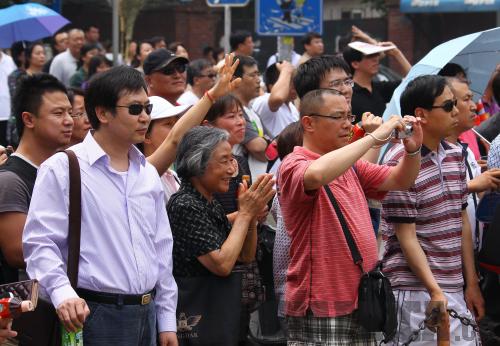|
 |
|
BETTER OPTIONS: College entrance exam regulations are pushing middle-class migrant workers to send their children to study overseas |
Calls for change
Since 2005, some migrant parents in Beijing have been urging the educational authorities to relax the restriction prohibiting high school students who are not registered in the city from taking college entrance exams there. These parents took to the streets and collected signatures to support their ideas.
In October 2011, a group of migrant parents released a proposal for reforming the eligibility requirements for taking the national college admission test, and handed over the proposal to the Ministry of Education. They proposed allowing students whose households are not registered in cities like Beijing and Shanghai to take the national college entrance exam there if the students attended a local school for a minimum of four consecutive years before graduating from high school.
But the proposal encountered opposition from local Beijingers and some migrants who had managed to register in Beijing. "If the restrictions were lifted, millions of students would flock to Beijing, occupying the limited school vacancies in the city," a local Beijinger surnamed Wu said.
Taking action
There seems to be a light at the end of the tunnel for migrant parents. In February 2012, the educational authority of east China's Shandong Province issued a plan to allow immigrant students who have completed their studies at a high school in Shandong to take college entrance exams in the province starting in 2014.
"I approve of the change in Shandong," Huang Teng, President of Xi'an International University and Deputy to the National People's Congress (NPC), told ChinAfrica during the sessions of NPC and Chinese People's Political Consultative Conference (CPPCC) in Beijing in March. According to him, in such a large country where people migrate frequently, it brings great hardships to migrant parents and their children to require migrant students to attend the college entrance exams in the location where their households are registered, and the government should make an institutional arrangement to solve this problem. "Metropolises such as Beijing and Shanghai should follow suit, because they belong to the whole nation, not only to local people. And students' right to take the national college entrance exam there should also be protected," he said.
"The reform in Shandong Province may not be suitable for big cities like Beijing and Shanghai. But it is of great significance," Zhao Dong said. He added that Beijing could have more requirements than Shandong Province, like requiring migrant students to have a consecutive enrollment in Beijing schools for five years or even longer.
Officials also pledged during the NPC and CPPCC sessions this year to reform the national college entrance examination. Du Yubo, Vice Minister of Education, said local governments should issue detailed policies on the reform and release a timetable by the end of this year, said a report by The Beijing News.
While solving the migrant students problem, the interests of local students will be taken into consideration to prevent overcrowding in cities like Beijing and Shanghai, Du added.
Zhao feels happy that the ministry had laid out a schedule to solve the issue. "It is likely that I don't have to send my kid abroad to attend university in the future," he said. |